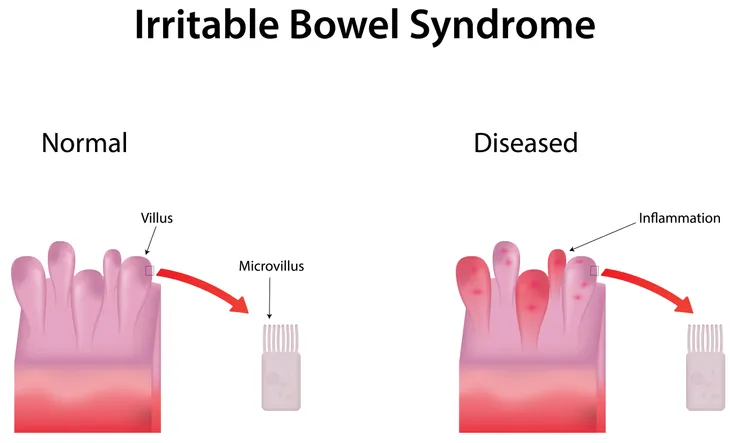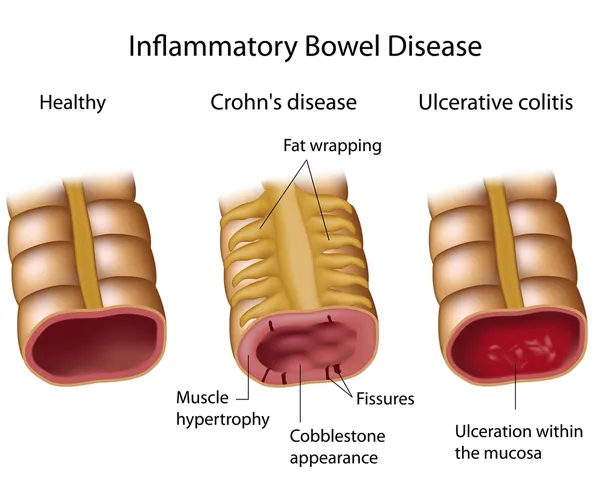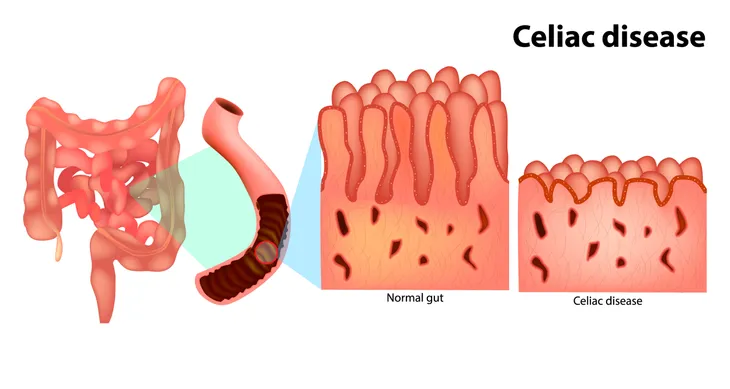- Diarrhea typically occurs as the result of a bacterial or viral infection. Another common cause is food poisoning or food intolerance.
- Chronic diarrhea occurs in people with diseases in their large intestine such as Crohn’s disease or colitis.
- Most of the time diarrhea clears up on its own, but depending on what’s causing the condition, it can be treated with medication.
After a particularly fatty feast or bout of the flu, diarrhea often rears its gassy, bloated, and uncomfortable presence. A spell of it often consists of loose, watery bowel movements that come on suddenly. People experiencing diarrhea are often hesitant to be far from a bathroom.
Typically, diarrhea occurs due to a virus, such as the stomach flu, in the digestive system. It lasts no more than a few days. However, long-term or frequent affliction can indicate other chronic diseases within the large intestine (or colon).
Here are the 12 most common causes of diarrhea…
Want diet & nutrition content delivered straight to your inbox? Sign up for our exclusive diet & nutrition newsletter!
Bacterial or Viral Infection
Infections from either bacteria, viruses, or parasites typically cause sudden diarrhea (clinically known as acute diarrhea). The Mayo Clinic lists Norwalk virus, cytomegalovirus, rotavirus, and viral hepatitis as some of the most common viral infections causing diarrhea. Another common one is the norovirus. Health.com notes that there have been several outbreaks of this virus in close quarters, including cruise ships, nursing homes, schools, and prisons, because it spreads so quickly from person to person. Thankfully, stomach bugs from viral infections tend to work their way out of the body within a few days.
Similar to viral infections, there are many bacterial infections that can enter the body through contaminated water or food (digestive tract infections that are spread through food or water are called food-borne illnesses). The National Institute of Diabetes and Digestive and Kidney Diseases (NIDDK) lists Campylobacter, Escherichia coli, Salmonella, and Shigella as the most common for causing diarrhea.
Bacterial infections will not go away quickly on their own without treatment. NIDDK also notes that some people may have trouble digesting certain foods such as carbohydrates, lactose or proteins, after suffering from an infection.
Food Poisoning
You’ll quickly notice after reading this list that contaminated food and water are the main gateways for bacteria, viruses, and parasites to find their way into your body and cause diarrhea. It can also cause vomiting and an upset stomach.
The most common culprits are E. coli, Salmonella, Campylobacter, Shigella, and Listeria. This bacteria is commonly found in foods, including eggs, raw and undercooked meats, shellfish, unpasteurized milk, and raw vegetables. They can also make their way into food that isn’t properly stored.
Always was produce thoroughly before eating. Be diligent about cooking meat, poultry, and fish. You must always wash your hands well before and after handling food, and be sure to clean any surfaces that have come into contact with food.
Traveler’s Diarrhea
Traveler’s diarrhea refers to the fact that so many people fall ill with acute diarrhea when traveling abroad. Another nickname is “Montezuma’s revenge,” says Health.com. Like many of the other causes on this list, traveler’s diarrhea comes about from eating food or drinking water that has been contaminated with bacteria, viruses, or parasites. It often happens because your body is not used to the microbes found in other countries and depending on where you are, their hygiene practices may be different.
There are many steps a traveler can take to avoid diarrhea. “Usually, the advice is to be careful: If you can’t peel it, don’t eat it. No tap water, and no ice,” says Lawrence Schiller, MD, a past President of the American College of Gastroenterology, to Health.com. Make sure the food is well cooked, drink bottled beverages, don’t brush your teeth with tap water, don’t eat from street vendors, and ask a doctor about prophylactic antibiotics or other medications before traveling.
Food Intolerance
One of the most common food intolerances is lactose intolerance, a sugar (lactose) found in all dairy products. “People who have difficulty digesting lactose have diarrhea after eating dairy products,” says the Mayo Clinic. This food intolerance can worsen with age as the level of enzymes that help digest lactose drop after childhood.
Another common food intolerance is to fructose (the sugar found in fruits and honey). It’s found in beverages like soft drinks, as well as to artificial sweeteners such as sorbitol, xylitol, and mannitol, which are commonly found in chewing gum and other sugar-free products. They can cause diarrhea in otherwise healthy people, says the Mayo Clinic.
An allergy to soy, cereal grains, eggs, and seafood may also cause diarrhea.
Stomach Flu
The stomach flu, also known as gastroenteritis, is caused by a virus. Even though we refer to it as the stomach flu, it’s technically not ‘the flu.’ The most common stomach flu viruses are rotavirus and norovirus. “Gastroenteritis also can be caused by a bacterium or a parasite. You can generally care for your stomach flu with home treatment,” says VeryWell Health.
Young children, the elderly, or anyone with a compromised immune system should be monitored carefully. They have a higher risk of becoming dehydrated while ill. Keep a close eye out for any other complications.
Certain Medications
Ironically enough, a medication used to treat and heal our bodies, such as antibiotics, can cause diarrhea. This occurs because antibiotics destroy both good and bad bacteria in the body which disrupts the natural balance, says the Mayo Clinic. As a result, this increases a person’s chances of becoming infected with Clostridium difficile.
Other medications known for causing diarrhea are cancer drugs, certain blood pressure medications, and nonsteroidal anti-inflammatory drugs, as well as antacids with magnesium.
Irritable Bowel Syndrome
Irritable bowel syndrome (IBS) is a major cause of diarrhea. This disorder causes an array of symptoms often occurring at the same time. These include bloating, diarrhea, constipation, and overall discomfort. Health.com explains that these symptoms vary depending on the person. Some people with IBS experience more diarrhea, while others tend to have more constipation. More often, people with IBS will alternate between the two.
While the exact cause of IBS is unknown, experts believe there is some link with how the brain communicates with the gut, as well as changes in the balance of gut bacteria. Unfortunately, there isn’t much a person can do about IBS. Medication will help keep symptoms at bay and a food diary can identify what foods trigger their symptoms. Certain foods (e.g., fast foods or highly processed foods) have been known to make the symptoms worse.
Inflammatory Bowel Disease
Inflammatory bowel disease (IBD) is often confused with IBS, most likely due to the fact that their names are so similar. However, they are completely different (to learn more about their differences read our article on Everything to Know About Irritable Bowel Syndrome vs. Irritable Bowel Disease). People with IBD will have structural damage or some kind of physical damage to their digestive system. It’s also an umbrella term for Crohn’s disease and ulcerative colitis. Health.com explains that both conditions cause the digestive tract to become inflamed, inhibiting the body’s ability to absorb and deliver nutrients.
While these two conditions are quite different, Crohn’s disease can occur anywhere along the gastrointestinal tract, while ulcerative colitis only targets the lining of the colon. Both result in diarrhea. “Experts aren’t sure what causes the two conditions, but it looks like genetics and the immune system are involved,” writes the source. There is no cure or real effective treatment for either condition.
Celiac Disease
Celiac disease is an autoimmune disease that affects only 1-percent of the population, notes Health.com. Similar to IBS, experts aren’t sure what causes celiac disease, but it’s clear the symptoms worsen when people with celiac disease eat gluten. One of the most common symptoms associated with celiac disease is diarrhea. Other symptoms include bloating, fatigue, nausea, vomiting, constipation, gas, and weight loss.
The best way to treat celiac disease is to follow a gluten-free diet. This is important because the effects of celiac disease can be extremely harmful. Celiac disease can lead to “damage of the lining of the intestine, anemia, and difficulty absorbing all the nutrients you need,” writes Health.com. Once a person cuts gluten out of their diet, their symptoms should subside, including the diarrhea.
Parasite
Parasites are small organisms like viruses or bacteria that enter the body through food or water and settle into the digestive tract, explains NIDDK. People pick up parasites while traveling, in raw or undercooked fish, or underdone beef and pork. Once infected, it can cause diarrhea. Parasites that are known to cause diarrhea are Cryptosporidium enteritis, Entamoeba histolytica, and Giardia lamblia.
Sean Drake, MD, a general internist at Henry Ford Health System in Sterling Heights, Michigan tells Health.com that some infections are worse than others. It’s extremely important to seek medical care if you notice blood in the stool or if the diarrhea lasts a long time.
Endocrine Disorders
Endocrine disorders mess with the body’s hormones which causes diarrhea. One of the most common endocrine disorders is diabetes. “[Anywhere from] 20- to 25-percent of people with long-standing diabetes have chronic diarrhea, particularly if they don’t take good care of [their diabetes],” says Dr. Schiller to Health.com.
Another common diarrhea-causing endocrine disorder is an overactive thyroid (hyperthyroidism). “The thyroid gland sitting in the front of your neck helps control metabolism,” says Dr. Drake to Health.com. “[An overactive thyroid] can cause weight loss, tremors, and heart palpitations. It also stimulates the gastrointestinal tract to move too quickly.” Another endocrine disorder causing diarrhea is Addison’s disease, which is when the body doesn’t produce enough cortisol or other hormones from the adrenal gland.
Thankfully, Dr. Drake points out that many of these disorders have treatments that can help ease the symptoms, including diarrhea.
Abdominal Surgery
People can sometimes develop diarrhea after undergoing abdominal surgery either on the appendix, gallbladder, large intestine, liver, pancreas, small intestine, spleen, or stomach, notes the NIDDK.
Treatment: Antidiarrheal Medication
Diarrhea often doesn’t require treatment, but some people will opt for over-the-counter medications to help them feel better. The most common options are loperamide (Imodium) which slows the movement of food through the intestine, and bismuth subsalicylate (Kaopectate, Pepto-Bismol) to balance how fluid moves through the digestive tract.
Before taking these medications, read the instructions carefully. Be mindful of when to take them and how much. WebMD warns that taking more than what the label suggests won’t make them work better or faster. These medications are not for anyone experiencing a fever or bloody stools. Also, do not give Kaopectate or Pepto-Bismol to children as it may cause serious health problems.
Treatment: Antibiotics
If diarrhea lasts for a long period of time, you’ll likely need to see a doctor to determine the underlying cause. Treatment will depend on what is causing the diarrhea. If it’s the result of an infection or parasite, you’ll likely need to take antibiotics. The Cleveland Clinic notes that it could be due to a specific condition like IBS, IBD, Crohn’s disease or ulcerative colitis. In this cause there’s specific medication for these conditions.
The same source notes that probiotics can also sometimes help re-establish a healthy biome to combat diarrhea. “Introducing probiotics can be helpful in some cases and some healthcare providers feel that it’s worth a try,” writes the source. Always consult a doctor before starting a probiotic or any supplement.
How to Manage Diarrhea at Home
Most of the time diarrhea will go away on its own without any treatment. The biggest concern with diarrhea is that people lose so many fluids and can easily become dehydrated. WebMD suggests getting lots of rest, drink plenty of fluids, and be mindful of what you’re eating. Drink water, broth or fruit juice throughout the day. Aim for 8 to 12-cups per day while sick.
While there is no particular food that can treat diarrhea, physicians no longer recommend following the BRAT diet (bananas, rice, applesauce, and toast). While these are still good choices, WebMD notes there are other options. Potatoes, smooth peanut butter, skinless chicken or turkey, and yogurt are all potential remedies for an upset stomach. Avoid foods that make diarrhea or gas worse. These are fatty or fried foods, spicy foods, raw fruits and vegetables, caffeinated drinks, beans, and cabbage.


















